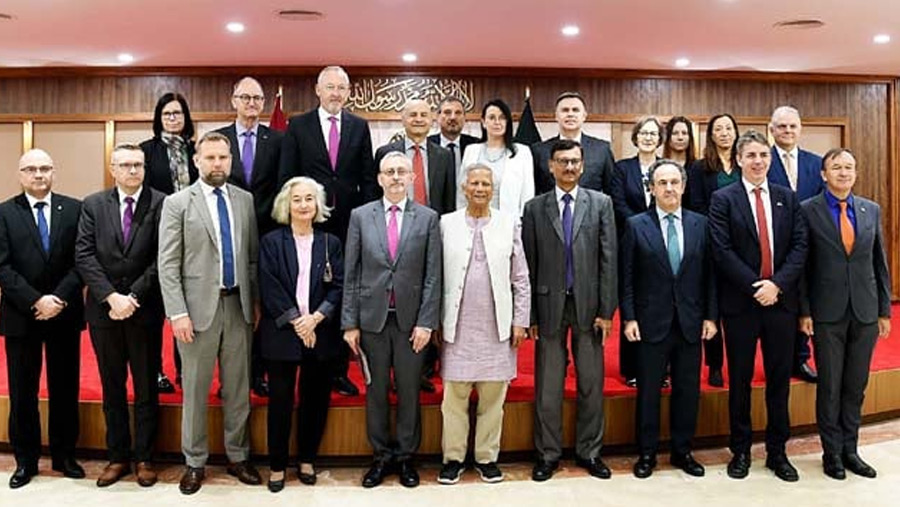


Ambassadors and diplomats of European Union (EU) countries have renewed their support for Bangladesh’s interim government in its democratic transition and efforts for carrying out vital reforms. The EU countries announced the support when they joined an interactive session with the Chief Adviser of the interim government Professor Dr. Muhammad Yunus at his office in Tejgaon, Dhaka on Monday (Dec 9), local media reported.
“European Union is committed to supporting Bangladesh’s democratic transition the best way we can,” Ambassador and Head of Delegation of the EU to Bangladesh Michael Miller said in his opening remarks. “As you know, the chief adviser already enjoyed rather broad relations; we do see strong potential for our partnership to grow even further,” he said.
Miller ended by reiterating the EU's stand 'in one voice' that the 27-nation group, which is the biggest export destination of Bangladesh goods, supports the interim government and the people of Bangladesh and its reform agenda. "We have only one message... we strongly support you," he added
Describing the occasion as an “exciting moment” in the month of victory, the Chief Adviser said this was a wonderful occasion that brought European diplomats based in Dhaka and New Delhi together. "This is a very special occasion to have you together. The fact that you assembled shows the support to Bangladesh – political support, as well as the economic support, moral support, and other support,” said the Chief Adviser. “This is something very rejuvenating for us, emerging out of a terrible situation that we had only four months back when students were killed in a large number,” he added.
Muhammad Yunus explained to the EU diplomats that the students mobilized people leading to the mass uprising and forced the then autocratic ruler to flee to neighbouring India.
A total of 19 diplomats, including 11 ambassadors and diplomats based in New Delhi, attended the meeting, and at least 15 of them participated in the interactive session.
Issues dominating the talks included labour rights, human rights, the Rohingya crisis, and international migration.
The Chief Adviser highlighted the strong sense of unity that exists in Bangladesh despite some propaganda and misinformation campaigns against his country. He also presented initiatives the interim government has so far taken to reform banking, economy and labour sectors before the European diplomats.
The Chief Adviser requested the European countries, which have visa offices in New Delhi, to relocate them to Dhaka or in any other neighbouring countries. He made the request against the backdrop of many Bangladeshi students facing difficulties in obtaining visas for getting enrolled to universities in European countries.
Ambassadors and diplomats from, Denmark, France, Germany, Italy, Spain, Sweden, the Netherlands, Belgium, Bulgaria, Estonia, Luxembourg, Slovakia, Cyprus, Hungary, Poland, Portugal, Slovenia and Romania joined the meeting.
Foreign Adviser Md. Touhid Hossain was also present.